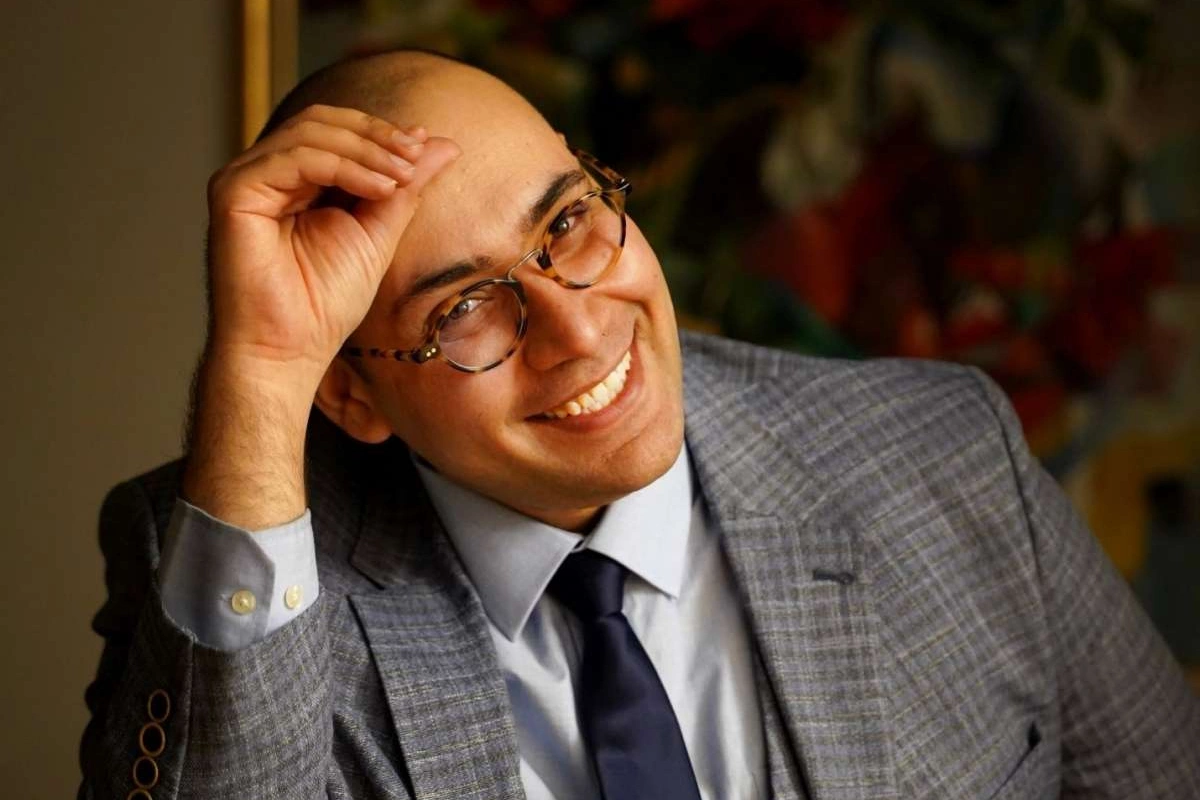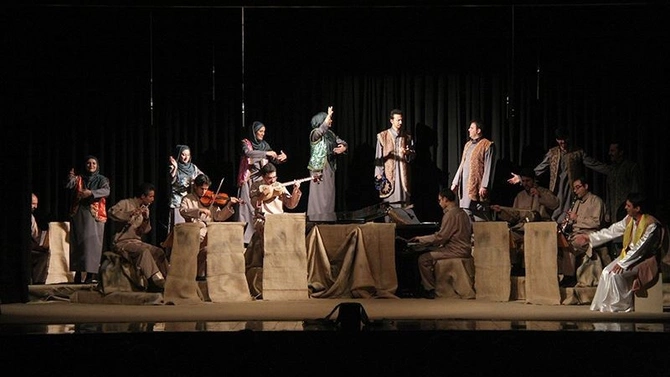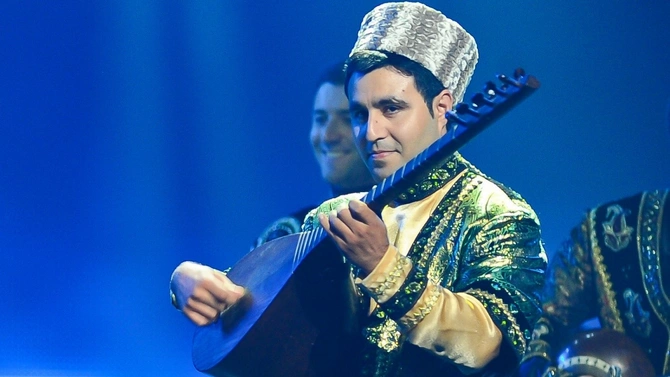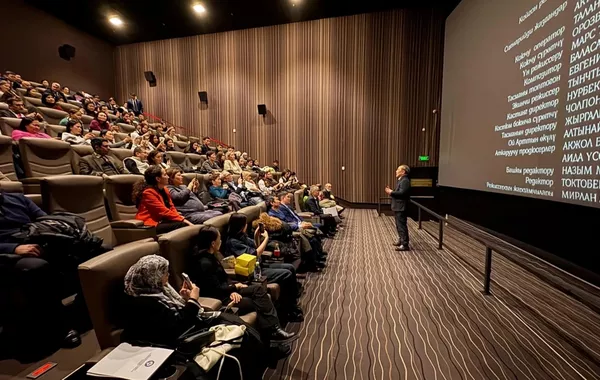
Vienna-based composer, ethnomusicologist and music theorist, Aria Torkanbouri, discusses some "not encouraging" realities for Azerbaijani-Turk musicians in Iran.
Image: Aria Torkanbouri/Twitter
Aria E. Torkanbouri is a Vienna-based composer, ethnomusicologist and music theorist. He was born in 1989 in Tabriz (Iranian Azerbaijan) and studied in Baku, Germany and Istanbul. While he started out writing pop-rock tunes and later moved into contemporary operatic genres, his themes have consistently focused on subject matter close to his roots as an Azerbaijani-Turk.
For example, he composed the music and wrote the libretto of an





Aria is also a pianist, author, and researcher, exploring topics around music theory and with special interests in the Azerbaijani-Turkish Ashiq and Mugham arts.
He has participated in a whole range of festivals, including the “Tabriz Music Festival” (Iran), “Alea III Contemporary Composition Competition” (USA), “Randspiel Contemporary Music Festival” (Germany), “Leicht Uber Linz Festival” (Austria) and “The Hajibeyli International Composition Competition” (USA).
In March 2020, with the COVID-19 pandemic raging and a global lockdown, Aria moved online, founding the Sound Union platform and holding two international virtual music competitions. In 2021, he founded Öst Ensemble in Vienna, performing traditional and classical music from the “Eastern” world. For the Caspian Post, Aria talked to Vahid Qarabagli about his career and the state of music back in his homeland.
Please tell us about your early life.
“Music was part of our family life, and I started to learn piano when I was seven. I was passionate about music and would try any instrument I could lay my hands on. So, by the time I was eighteen, I had learned to play quite a few. But I focused on the piano since that was what I knew the best and was most passionate about. At 18, I began my career as a pianist in Tabriz music groups. Through this, I became interested in composition. Unfortunately, at that time, there was no one in Tabriz from whom I could get lessons on subjects such as music theory and composition.
So is that when you went abroad?
Not initially. In 2007, I moved to Tehran and took private lessons in composition, music theory, and aural skills from the Tehran University of Arts. I studied under some fine professors, including Hamid Reza Dibazar, Kiawasch Saheb Nassagh, and Mohammadreza Tafazzoli.
By this stage, I was already composing musical works in the pop and rock genres. One of my first was

Then in 2010, I was accepted into a bachelor’s degree in composition [north of the border] at the Baku Academy of Music. There, I attended composition and piano classes by renowned composers and pianists of Azerbaijan, such as Arif Malikov, Jeyhun Allahverdiyev, and Lala Rzayeva. Unfortunately, after two years of study in Baku, in 2012, I had to stop my education and return to Tabriz. That was due to [the effect of] financial problems that Iran faced with sanctions related to its nuclear program.
How did you feel about that?
Back in Tabriz, I founded the Lachin Ensemble, and for them, I composed some of my most important works. Notably, in 2014


Image: Lachin Ensemble | Facebook
The opera got me noticed, and, in 2014, I was invited to Germany as a guest student. I studied for a semester at the Academy of Music Hanns Eisler in Berlin and attended composition courses by Eres Holz. From there, I returned to Baku to continue my unfinished studies, receiving lessons in orchestral conducting by Ayyub Guliyev. In 2015, my hour-long musical history of Tabriz,

The same year I moved to Istanbul, later continuing to Austria, where I graduated in 2020 from the University of Music and Performing Arts, Graz, having studied under Beat Furrer.
As you can see, the harsh economic and political situation in Iran affected my educational path. Although challenging, it provided me with opportunities, connections, experiences, and insight into a wide range of different musical approaches - American, Soviet, French, German, and contemporary European. My education in composition and music theory took a long time, but this long path certainly expanded my horizons. It helped me develop critical thinking and an undogmatic understanding of music. Now I’m working towards an MA in Ethnomusicology at the University of Music and Performing Arts Vienna, where I’ve studied with Ursula Hemetek, Svanibor Pettan and Ulrich Morgenstern.
How do you see the state of music in Iranian Azerbaijan?
I think the state of music in Iranian Azerbaijan is not encouraging. Our young artists produce pop, rock, and jazz pieces in the sound system and music which is not ours and assimilated. It is pleasing that their language is [Azerbaijani] Turkish, but music is more than language. As I will discuss more in detail, this assimilation is conditioned by the marginalization of our language, the absence of education in our music, and the hegemony of Farsi and Western music forces.
First, our language, Turkish, is not used in education in Iran. It is also excluded from mainstream media, art, and cultural spaces. In other words, our language and culture are made invisible and subjected to assimilation. Because of these political arrangements, our music, too, is ignored, marginalized, and faced with assimilation. Language is an integral part of the music. With our language deemed “undesirable” by the dominant political and ideological establishment in Iran, our music is also left to struggle in this hostile environment. The Turkish Ashiq art of Azerbaijan is a cultural symbol of all our people, but it is mocked and ridiculed on Iran’s national television channels.

Image: Wikimedia Commons
In contrast, Persian traditional music is framed as the “national” music of the country and treated with appreciation and respect. These representations negatively shape our people and other groups’ views of Ashiq art and its worth. Many of our people seem ashamed of their language, music, and art. The system has created and shaped this mindset.
Second, there is no music education or pedagogy in Iran on our Azerbaijani-Turkish music. Like our language, we are also deprived of opportunities to learn about our music, its features and history. Consequently, in the lack of this music pedagogy, our music cannot grow, find a place for itself, or be produced in high-quality. This condition is favourable for our assimilation into the dominant Farsi music in the country, which is backed by the government and enjoys institutional support, popular culture, and false assumptions about its “superiority” over “other” musical traditions in the country.
The third challenge is Western music hegemony. This force imposes itself in the music sphere all over the world. To some degree, big countries with resources can resist it. Yet, it has a far more significant impact on communities like ours because of our unique situation discussed above. The Western music hegemony (with styles such as pop, rock, jazz, etc.) imposes itself through satellites, the internet, media, etc. In many parts of the world, including Iran, those who want to become musicians mainly receive music education based on Western music theory. In other words, Western music theory became equivalent to music education. Although the Iranian regime promotes “anti-Western” sentiment, it provides a conducive environment for the education of Western music in [Iranian] Azerbaijan’s private music schools. In other words, they use Western music dominance as a very effective means of erasing our music. This is problematic. We need a music education based on the diversity and richness of different musical traditions, including our own.
As it should be evident by now, I believe that there are political, ideological, and global forces that have contributed to the formation of the current state of music in Iranian Azerbaijan. So, one might ask, “what should we do to overcome those challenges and bring change?” Let us do what we can. The first thing we should do is to critically evaluate, reflect and talk about the state of our music and its challenges. For this, we should invite those involved in music and art in our community into a conversation. Our musicians should know that despite all the difficulties and shortcomings, we should do our best to educate ourselves and our music community about the principles and foundations of our music.
Share on social media
